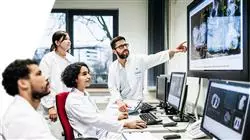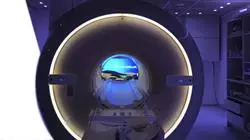University certificate
The world's largest faculty of medicine”
Introduction to the Program
Thanks to this Master's Degree, the professional will obtain valuable and high-quality information on the momentum of E-Health and Big Data in the health field"

In the 1970s, telemedicine began to be developed as a method of overcoming geographical barriers between patients and medical professionals. However, it was not until the massive arrival of new technologies to the population that integration in the healthcare field really took place.
In this way, two disciplines, which may seem unconnected, such as Engineering and Medicine, are brought together. However, multidisciplinarity has meant that, in recent years, there has been an important advance in the creation of intelligent devices, which allow patient monitoring or the supply of medication doses in people with diabetes. The healthcare professional cannot be oblivious to these advances. That is why this 100% online program was created, which offers the latest and most advanced information on E-Health and Big Data.
An intensive program, where over 12 months, the specialist will delve into Molecular Medicine, research in Health Sciences or the latest technical advances in recognition and intervention through biomedical imaging. All this, through multimedia teaching resources that can be accessed, comfortably, at any time of the day, from an electronic device with an Internet connection.
A syllabus with a modern approach that will allow you, thanks to the Relearning method, to advance through the content in a much more natural and progressive way. Therefore, with the repetition of key concepts, the graduate will be able to reduce the long hours of study and memorization.
In this way, TECH offers medical professionals an excellent opportunity to update their knowledge of E-Health and Big Data, through a high-level and quality program. And the fact is that the graduate who enters this program will not be in attendance and will be able to distribute the teaching load according to their needs. A great opportunity to update knowledge through an educational option for current times.
Get an update of knowledge in E-Health and Big Data through a 100% online program and without classes with fixed schedules"
This Master's Degree in E-Health and Big Data contains the most complete and up-to-date scientific program on the market. The most important features include:
- Practical cases presented by experts in Information and Communication Technology focused on the healthcare services
- The graphic, schematic, and practical contents with which they are created, provide scientific and practical information on the disciplines that are essential for professional practice
- Practical exercises where self-assessment can be used to improve learning
- Its special emphasis on innovative methodologies
- Theoretical lessons, questions to the expert, debate forums on controversial topics, and individual reflection assignments
- Content that is accessible from any fixed or portable device with an Internet connection
This educational program will lead you to delve into trends in the field of Big Data in biomedical research and public health"
The program’s teaching staff includes professionals from the sector who contribute their work experience to this educational program, as well as renowned specialists from leading societies and prestigious universities.
The multimedia content, developed with the latest educational technology, will provide the professional with situated and contextual learning, i.e., a simulated environment that will provide immersive education programmed to learn in real situations.
This program is designed around Problem-Based Learning, whereby the professional must try to solve the different professional practice situations that arise throughout the program. This will be done with the help of an innovative system of interactive videos made by renowned experts.
TECH Global University provides you with the most recent and innovative knowledge on the use of bioprocess engineering tools"

Access when you want, to a program that provides you with innovative pedagogical tools and according to the present educational times"
Why study at TECH?
TECH is the world’s largest online university. With an impressive catalog of more than 14,000 university programs available in 11 languages, it is positioned as a leader in employability, with a 99% job placement rate. In addition, it relies on an enormous faculty of more than 6,000 professors of the highest international renown.

Study at the world's largest online university and guarantee your professional success. The future starts at TECH”
The world’s best online university according to FORBES
The prestigious Forbes magazine, specialized in business and finance, has highlighted TECH as “the world's best online university” This is what they have recently stated in an article in their digital edition in which they echo the success story of this institution, “thanks to the academic offer it provides, the selection of its teaching staff, and an innovative learning method aimed at educating the professionals of the future”
A revolutionary study method, a cutting-edge faculty and a practical focus: the key to TECH's success.
The most complete study plans on the university scene
TECH offers the most complete study plans on the university scene, with syllabuses that cover fundamental concepts and, at the same time, the main scientific advances in their specific scientific areas. In addition, these programs are continuously being updated to guarantee students the academic vanguard and the most in-demand professional skills. In this way, the university's qualifications provide its graduates with a significant advantage to propel their careers to success.
TECH offers the most comprehensive and intensive study plans on the current university scene.
A world-class teaching staff
TECH's teaching staff is made up of more than 6,000 professors with the highest international recognition. Professors, researchers and top executives of multinational companies, including Isaiah Covington, performance coach of the Boston Celtics; Magda Romanska, principal investigator at Harvard MetaLAB; Ignacio Wistumba, chairman of the department of translational molecular pathology at MD Anderson Cancer Center; and D.W. Pine, creative director of TIME magazine, among others.
Internationally renowned experts, specialized in different branches of Health, Technology, Communication and Business, form part of the TECH faculty.
A unique learning method
TECH is the first university to use Relearning in all its programs. It is the best online learning methodology, accredited with international teaching quality certifications, provided by prestigious educational agencies. In addition, this disruptive educational model is complemented with the “Case Method”, thereby setting up a unique online teaching strategy. Innovative teaching resources are also implemented, including detailed videos, infographics and interactive summaries.
TECH combines Relearning and the Case Method in all its university programs to guarantee excellent theoretical and practical learning, studying whenever and wherever you want.
The world's largest online university
TECH is the world’s largest online university. We are the largest educational institution, with the best and widest online educational catalog, one hundred percent online and covering the vast majority of areas of knowledge. We offer a large selection of our own degrees and accredited online undergraduate and postgraduate degrees. In total, more than 14,000 university degrees, in eleven different languages, make us the largest educational largest in the world.
TECH has the world's most extensive catalog of academic and official programs, available in more than 11 languages.
Google Premier Partner
The American technology giant has awarded TECH the Google Google Premier Partner badge. This award, which is only available to 3% of the world's companies, highlights the efficient, flexible and tailored experience that this university provides to students. The recognition as a Google Premier Partner not only accredits the maximum rigor, performance and investment in TECH's digital infrastructures, but also places this university as one of the world's leading technology companies.
Google has positioned TECH in the top 3% of the world's most important technology companies by awarding it its Google Premier Partner badge.
The official online university of the NBA
TECH is the official online university of the NBA. Thanks to our agreement with the biggest league in basketball, we offer our students exclusive university programs, as well as a wide variety of educational resources focused on the business of the league and other areas of the sports industry. Each program is made up of a uniquely designed syllabus and features exceptional guest hosts: professionals with a distinguished sports background who will offer their expertise on the most relevant topics.
TECH has been selected by the NBA, the world's top basketball league, as its official online university.
The top-rated university by its students
Students have positioned TECH as the world's top-rated university on the main review websites, with a highest rating of 4.9 out of 5, obtained from more than 1,000 reviews. These results consolidate TECH as the benchmark university institution at an international level, reflecting the excellence and positive impact of its educational model.” reflecting the excellence and positive impact of its educational model.”
TECH is the world’s top-rated university by its students.
Leaders in employability
TECH has managed to become the leading university in employability. 99% of its students obtain jobs in the academic field they have studied, within one year of completing any of the university's programs. A similar number achieve immediate career enhancement. All this thanks to a study methodology that bases its effectiveness on the acquisition of practical skills, which are absolutely necessary for professional development.
99% of TECH graduates find a job within a year of completing their studies.
Master’s Degree in E-Health and Big Data
Digital health and the use of big data for decision-making are becoming an increasingly present reality in the healthcare sector. Technology is transforming the way healthcare services and patient information are managed, and this trend is expected to continue growing. For this reason, TECH Global University has created the Master’s Degree in E-Health and Big Data, a program designed to train professionals in the latest trends and technologies. This innovative Master’s Degree combines knowledge in technology, health, and data management to train leaders in the digital transformation of the healthcare sector. Through the use of advanced tools and technologies, students will learn to manage large volumes of information and use it to make strategic decisions. The knowledge and skills acquired will enable them to lead digital health projects, improving the quality of services and patient care.
Become an expert in health information management and lead the digital transformation of the sector
The Master’s Degree in E-Health and Big Data from TECH Global University boasts a team of highly qualified and experienced professors in the sector. Furthermore, the learning methodology is based on practice and teamwork, allowing students to develop skills and knowledge applicable to real-world situations. The Master’s Degree in E-Health and Big Data from TECH Global University is an excellent opportunity for professionals who wish to stay at the forefront of health information management and lead the digital transformation of the sector. Become an expert in the field and contribute to improving people's quality of life through technology.







